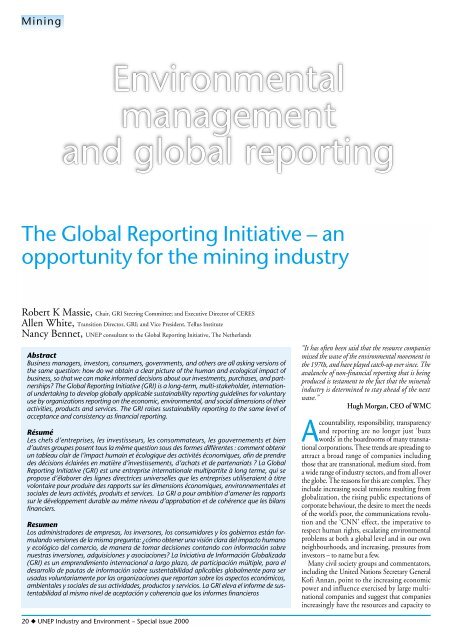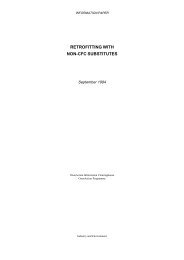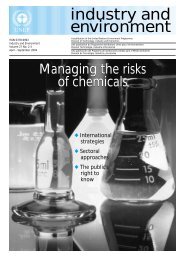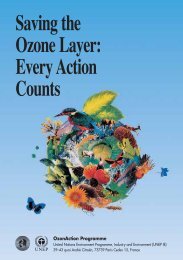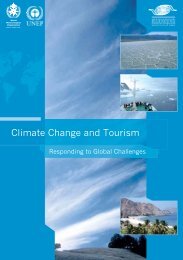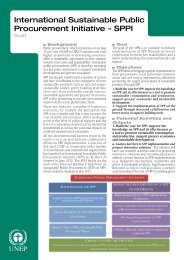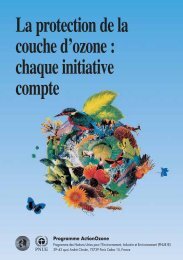Mining and Sustainable Development II - DTIE
Mining and Sustainable Development II - DTIE
Mining and Sustainable Development II - DTIE
Create successful ePaper yourself
Turn your PDF publications into a flip-book with our unique Google optimized e-Paper software.
<strong>Mining</strong><br />
Environmental<br />
management<br />
<strong>and</strong> global reporting<br />
The Global Reporting Initiative – an<br />
opportunity for the mining industry<br />
Robert K Massie, Chair, GRI Steering Committee; <strong>and</strong> Executive Director of CERES<br />
Allen White, Transition Director, GRI; <strong>and</strong> Vice President, Tellus Institute<br />
Nancy Bennet, UNEP consultant to the Global Reporting Initiative, The Netherl<strong>and</strong>s<br />
Abstract<br />
Business managers, investors, consumers, governments, <strong>and</strong> others are all asking versions of<br />
the same question: how do we obtain a clear picture of the human <strong>and</strong> ecological impact of<br />
business, so that we can make informed decisions about our investments, purchases, <strong>and</strong> partnerships?<br />
The Global Reporting Initiative (GRI) is a long-term, multi-stakeholder, international<br />
undertaking to develop globally applicable sustainability reporting guidelines for voluntary<br />
use by organizations reporting on the economic, environmental, <strong>and</strong> social dimensions of their<br />
activities, products <strong>and</strong> services. The GRI raises sustainability reporting to the same level of<br />
acceptance <strong>and</strong> consistency as financial reporting.<br />
Résumé<br />
Les chefs d’entreprises, les investisseurs, les consommateurs, les gouvernements et bien<br />
d’autres groupes posent tous la même question sous des formes différentes : comment obtenir<br />
un tableau clair de l’impact humain et écologique des activités économiques, afin de prendre<br />
des décisions éclairées en matière d’investissements, d’achats et de partenariats ? La Global<br />
Reporting Initiative (GRI) est une entreprise internationale multipartite à long terme, qui se<br />
propose d’élaborer des lignes directrices universelles que les entreprises utiliseraient à titre<br />
volontaire pour produire des rapports sur les dimensions économiques, environnementales et<br />
sociales de leurs activités, produits et services. La GRI a pour ambition d’amener les rapports<br />
sur le développement durable au même niveau d’approbation et de cohérence que les bilans<br />
financiers.<br />
Resumen<br />
Los administradores de empresas, los inversores, los consumidores y los gobiernos están formul<strong>and</strong>o<br />
versiones de la misma pregunta: ¿cómo obtener una visión clara del impacto humano<br />
y ecológico del comercio, de manera de tomar decisiones cont<strong>and</strong>o con información sobre<br />
nuestras inversiones, adquisiciones y asociaciones? La Iniciativa de Información Globalizada<br />
(GRI) es un emprendimiento internacional a largo plazo, de participación múltiple, para el<br />
desarrollo de pautas de información sobre sustentabilidad aplicables globalmente para ser<br />
usadas voluntariamente por las organizaciones que reportan sobre los aspectos económicos,<br />
ambientales y sociales de sus actividades, productos y servicios. La GRI eleva el informe de sustentabilidad<br />
al mismo nivel de aceptación y coherencia que los informes financieros<br />
“It has often been said that the resource companies<br />
missed the wave of the environmental movement in<br />
the 1970s, <strong>and</strong> have played catch-up ever since. The<br />
avalanche of non-financial reporting that is being<br />
produced is testament to the fact that the minerals<br />
industry is determined to stay ahead of the next<br />
wave.”<br />
Hugh Morgan, CEO of WMC<br />
Accountability, responsibility, transparency<br />
<strong>and</strong> reporting are no longer just ‘buzz<br />
words’ in the boardrooms of many transnational<br />
corporations. These trends are spreading to<br />
attract a broad range of companies including<br />
those that are transnational, medium sized, from<br />
a wide range of industry sectors, <strong>and</strong> from all over<br />
the globe. The reasons for this are complex. They<br />
include increasing social tensions resulting from<br />
globalization, the rising public expectations of<br />
corporate behaviour, the desire to meet the needs<br />
of the world’s poor, the communications revolution<br />
<strong>and</strong> the ‘CNN’ effect, the imperative to<br />
respect human rights, escalating environmental<br />
problems at both a global level <strong>and</strong> in our own<br />
neighbourhoods, <strong>and</strong> increasing, pressures from<br />
investors – to name but a few.<br />
Many civil society groups <strong>and</strong> commentators,<br />
including the United Nations Secretary General<br />
Kofi Annan, point to the increasing economic<br />
power <strong>and</strong> influence exercised by large multinational<br />
companies <strong>and</strong> suggest that companies<br />
increasingly have the resources <strong>and</strong> capacity to<br />
20 ◆ UNEP Industry <strong>and</strong> Environment – Special issue 2000


